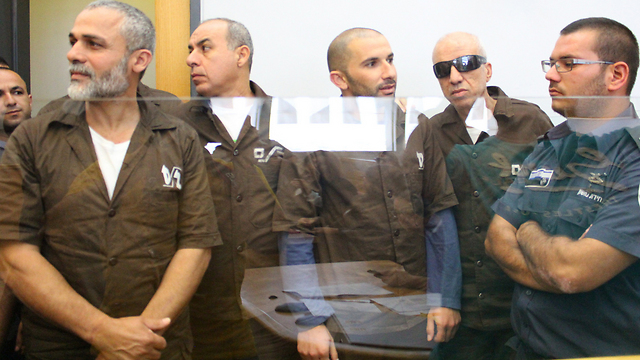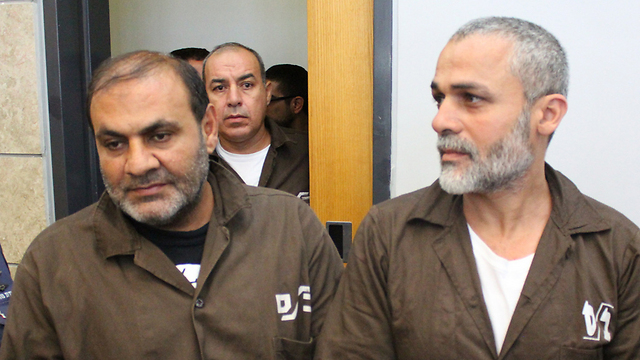
The Parole Commission decided on Tuesday that six terrorists who were freed in the Shalit prisoner swap deal, and were arrested again during Operation Brother's Keeper, will return to prison to serve out the rest of their time. The six, from East Jerusalem, were all sentenced to life in prison.
The commission determined that the six violated the parole conditions set when President Shimon Peres approved their released for the return of IDF soldier Gilad Shalit, who spent over five years in Hamas captivity.
Four additional terrorists were expected to face the Parole Commission in the coming days.
The first of the terrorists to return to prison, Alaa al-Din al-Bazyan, was sentenced to life in prison for the murder of Zehava Ben-Ovadia, perpetrating sniper attacks and belonging to a terrorist group. The parole violation that landed him back in prison was, among other things, his participation in a rally in support of terror activity.
Another terrorist is Adnan Muhammad Atta Maragha, who was sentenced to life for the murder of a man he suspected was a collaborator with Israel. The state said he violated his parole when he returned to activity in the Popular Front for the Liberation of Palestine.
A third terrorist is Rajab al-Tahhan, who was sentenced to life for the murder of David Catorza, who was on his way to the synagogue. Tahhan was also convicted of unlawful transfer of weapons and conspiring to commit a crime. He was arrested again because he was in contact with Hamas operatives in the West Bank and Gaza Strip and received funds from the organization.
The fourth terrorist, Nasser Abd Rabbah, was sentenced to life after he was convicted along with others for the murder of a prisoner they suspected was collaborating with Israel. He too resumed contact with terrorists upon his release.
The fifth terrorist, Jamal Abu Saleh, was sentenced to life while serving time in Shata Prison, when he murdered another prisoner he suspected was a collaborator with Israel. The state claimed that following his release, he was in contact with terrorists in Jerusalem, the West Bank and the Gaza Strip.
The sixth terrorist, Ismail Hijazi, was sentenced to life for murder, the manufacturing, importing and purchasing of arms and belonging to a terror organization. Among other things, he was in contact with terrorists after his release and received funds from Hamas.
The commission members determined that even though in principle there is no difference between these security prisoners and other prisoners, the difference was that they were not released by a commission "that determined the prisoner was suitable for release and does not pose a threat," but rather they were released as part of a prisoner swap deal.
They rejected claims on the timing of the arrest - during the operation to locate the three kidnapped Israeli teens and their abductors. The commission said that "the claims of the prisoners' representative that this was 'revenge,' and that they were being 'punished' by the authorities, are not relevant."
The commission, headed by retired judge Aaron Melamed, stated that the only criterion they ought to heed was whether the terrorists violated their parole conditions.
The Justice Ministry said that even if this was not an unprecedented decision, this is a rare decision in which prisoners released in a political deal are returned to prison to serve out their terms for violating their parole.

















